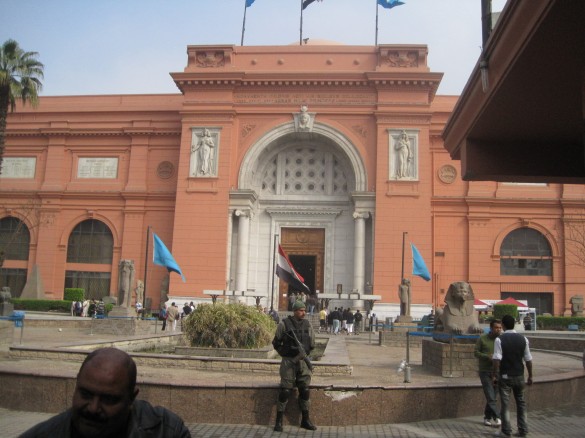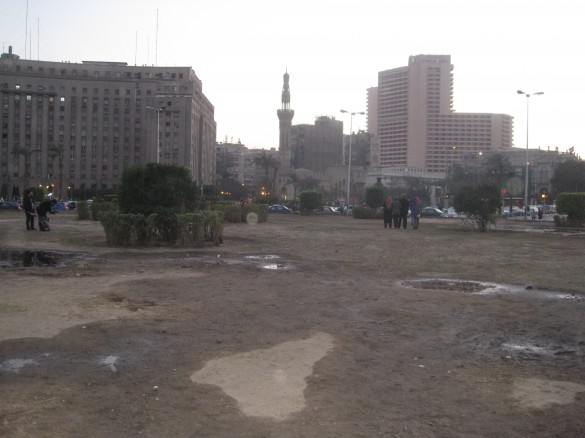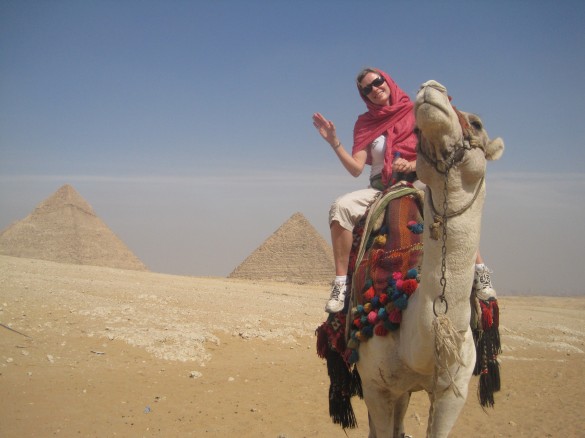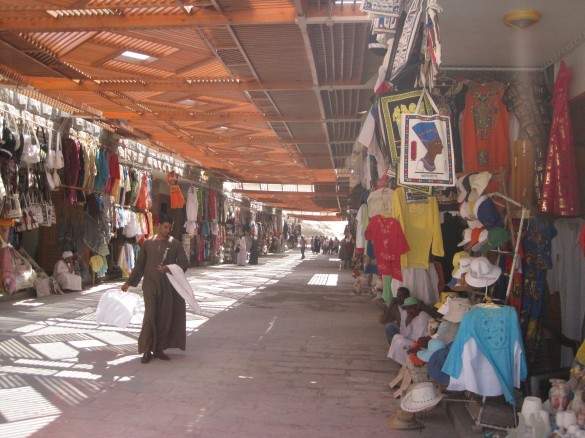Is it a good idea to travel to a country when there’s a travel advisory? Certainly, there’s a large body of opinion that would suggest not. However, on a visit to Egypt a couple of weeks ago, I was forcefully and compellingly persuaded, “well, maybe”. Am I crazy? Am I a daredevil risk-taker by nature? Absolutely not. But when I decided to take my husband and two school-aged children to Egypt, it was not without trepidation. And after my experiences there, would I go back now that political unrest has again been in the international media? Yes, I would, and here’s why.
Go with a guide. Either pre-book a tour from home, or arrange a guide at your hotel. Tourism is the second largest industry in the Egyptian economy and Egyptians working in the business are professionally trained and university-educated. Studying tourism at a post secondary institution, I was told, is akin to studying medicine in western culture. Tourism is a prestigious career path for an Egyptian. So the people who are guiding tourists from place to place are knowledgeable and nowadays very careful that travellers there feel safe. A friendly people with a strong sense of humour, they are hyper-motivated to treat tourists extremely well. When I was there in late March, they certainly did.

I felt completely safe at all times during my time in Egypt. Well ok, maybe that isn’t completely true. My government had, and still is, advising Canadians to avoid travel to several parts of Egypt. So when our guide told us when we arrived in Cairo that there was a possibility of demonstrations later in the week, while we were supposed to be visiting Tahir Square, I almost had an anxiety attack right then and there. But Abduhla explained why demonstrations were a possibility, had an intelligent analysis of what he thought were likely outcomes (none too scary) and immediately had several suggested changes to our itinerary to make sure we weren’t near where they were going to be. After suppressing the urge to hug him (most definitely would have been frowned on and not got us off to a good start), we saw all the sites in Cairo we wanted to without incident. When we had questions about what we were hearing from others and from media sources, all our guides throughout Egypt had ready information that was well-balanced and intelligent.

As a western woman, it helps to not hug your male tour guide. It also helps to dress modestly (loose clothing without exposing too much skin), and not to engage socially with male strangers unless you are transacting business. Talk to men who are strangers only after you’ve been spoken to. Take a large thin scarf as part of your modest wardrobe. South of Cairo, the weather is hotter and I found it helpful to have a large thin scarf so I could wear a short sleeved t-shirt and cover up when I needed to. While in Cairo, I also chose to throw it over my hair sometimes as all of the Egyptian women on the streets cover their heads. Interestingly, they didn’t cover their heads in places of work – like shops and restaurants. Like travel in other parts of the world, but especially now and especially in Egypt, be respectful of the culture you are visiting. They’re happy you’ve come to see their country…don’t feel like you have to drag yours with you. Learn a few words of Arabic, try Egyptian food, mold yourself to their customs as you can, and know you are welcome.
My whole family was very welcomed wherever we went. People calling “Hello! Welcome!!” from across eight lanes of crazy Cairo traffic (but that’s another story) with horns honking. Half the time the exchange would end there, but the other half our greeter would make his way over to us, ask us where we were from and then perhaps try to get us to come to his “brother’s” store to see something or other that was on “big discount”. In hotels and out doing tourist-y things, we felt very appreciated. Often times people thanked us for coming, checked and double-checked we were happy with whatever was happening. We were helped across streets, asked if we needed anything if we were standing around with that dazed “tourist” look, and my husband was complimented many times on his “beautiful family”. Unlike other parts of the world, I didn’t worry about pickpockets, I didn’t receive any unwanted male attention, and my children were well looked after.

Actually, my children were the centre of attention wherever we went. Egyptians would play with them, welcome them, talk with them. If I turned my attention away from my son, who doesn’t like shopping at the best of times, often a gentleman from the neighboring store would be sitting in the doorstep with him playing a game, or asking me if he could give him a cold drink.
Shopping for any tourist trinket or souvenir is a full-on experience and one that could prove daunting if you’re not willing to negotiate and, more importantly, keep your sense of humour! First of all, you must share where you are from, receive compliments about your family, have a glass of hibiscus tea or soft drink, and then, and only then, discuss what you can pay.
During one funny negotiation, the proprietor patted my blonde-haired daughter’s head.
“Lovely girl. I offer you 5 million camels for her hand in marriage.”
My eleven-year old’s eyes widened, looking insulted (especially since she’s in that “boys are icky” phase of girlhood).
“No, thank you,” I said smiling and trying not to laugh. And then back to the negotiation in progress.
Then when it seemed I might walk away without purchasing from him…“10 million camels!” he said with a smile and my daughter starts tugging on my sleeve, hissing through clenched teeth…”Mom!”
By the time we got to an agreed upon price for his piece of merchandise, he’d upped his marriage offer to twenty million camels.
But as my daughter and I walked away, I said to her to reassure her I’d never sell her in marriage, “What would I do with twenty million camels back home anyway?”
And then we had a good laugh.

All over Egypt, tourism is down 60-75% of normal levels. This is a huge opportunity for travelers to visit sites that normally attract hundreds of thousands of visitors each day (200,000 per day to Cairo’s Egyptian Museum). It’s easy and common to have an Egyptologist accompany you to sites like the pyramids, museums, mosques and markets. Now, instead of being with a group of twenty or more, you will likely be on your own private tour.
You can do this for significantly less than you might normally pay. Hotels and restaurants are empty. Combine that with a consumer culture that is barter and negotiation-driven anyway, and you could find some great deals out there. It’s a great time for the independent traveler to show up and negotiate guides, hotels and other services for a fraction of what they would normally cost because there is no concern about finding space!
It would be easy to paint a picture of a scary and dangerous place based on the information available in the media and on the internet. Before I left for Egypt, I was really afraid, given what had been in the news. So when my family had this amazing two week trip through different parts of Egypt, and were in Cairo during the voting on constitutional changes and a minor protest involving a fire in a government building on Tahir Square, I was so struck with how incredibly different our experience was from how afraid I had been leaving Canada, and how I worried the trip might be. What we ended up with was the trip of a lifetime and perhaps that is waiting out there for you too.